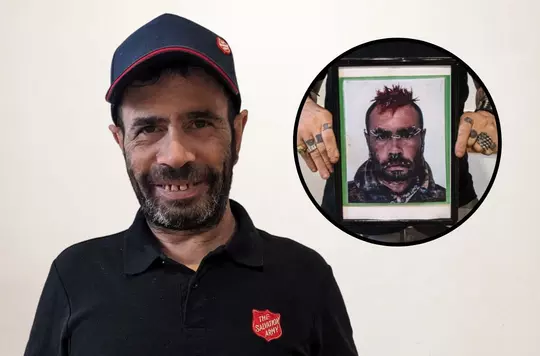24 August 2024
Together in perseverance
Major Steven Turner
Major Steven Turner encourages us to keep going.
Key text
On a lovely summer’s day, I recently completed the Aberdeen Kiltwalk, an 18-mile trek from Aberdeen to Banchory. We started in company with fellow walkers, sharing mutual encouragement. By mile 15, we were spread out and isolated. The final hour was a hard slog but, with the finishing funnel lined with cheering supporters, I crossed the line on a high.
Pause and reflect
- When have you relied on others to get you through a difficult situation?
- Have you ever supported someone going through a tough time?
Knowing that the course was well prepared and I had completed three similar events, I started the walk with confidence. But where does our confidence as Christians come from? In the first nine chapters of Hebrews, the writer explains the significance of Jesus as the fulfilment of Old Testament priesthood and describes how ‘he entered the Most Holy Place once for all by his own blood, so obtaining eternal redemption’ (Hebrews 9:12). In doing so, Jesus became our once-for-all atoning sacrifice and our high priest. This offers us confidence to enter the very presence of God.
Pause and reflect
- What is the foundation of your faith in Jesus?
At the beginning of our study passage, the writer exhorts: ‘Therefore … let us’ (vv19–22). The word ‘let’ implies permission to do something and the imperative to get on with it. The ‘us’ suggests that we should do it together. Let us look at four uses of ‘let us’ in the passage.
‘Let us draw near to God’ (v22). At the beginning of corporate worship, we often talk of entering the presence of God. This echoes the description of offerings in Leviticus 1:2, where two related Hebrew words qārbān – ‘offering’ – and qārab – ‘approach’ – signify bringing a gift. Before they offered sacrifices, priests would purify themselves.
David describes acceptable gifts: ‘The sacrifices of God are a broken spirit; A broken and a contrite heart, God, you will not despise’ (Psalm 51:17 New American Standard Bible). Similarly, the writer to the Hebrews invites us to approach God mindful of the condition of our hearts and bodies.
Pause and reflect
- How can we help each other enter God’s presence?
‘Let us hold unswervingly to the hope we profess’ (v23). This Saturday, hundreds of runners will set out on the Inov-8 Pennine Trail Marathon, which includes steep climbs and descents over four major peaks. If they hope to complete the course, the runners will need determination and confidence in their training and ability.
Likewise, as Christians, we are called to ‘hold unswervingly to the hope we profess’. This is not a wishful hope, because ‘he who promised is faithful (v23). Paul, writing to the Philippians, says: ‘He who began a good work in you will carry it on to completion until the day of Christ Jesus’ (1:6).
Pause and reflect
- What past experiences give you confidence in God for the future?
‘Let us consider how we may spur one another on toward love and good deeds’ (v24). In Ray Blackston’s novel Flabbergasted: A Novel, Jay Jarvis, newly arrived in Greenville, South Carolina, joins a weekly house group with eight other young men. Aside from talking about girls, they begin to open up about their personal lives. Surfer dude Ransom, the only married man present, advises that since they all share the same struggles, they need to consistently encourage each other to avoid tempting situations. Minutes later, they hold a whip-round so a fellow member can afford a decent meal.
It’s fiction, but it echoes church growth teaching on the importance of meeting in small groups.
Doing good doesn’t always come naturally, even in a small group of Christian friends. I know that I should floss my teeth, eat my five a day, exercise regularly, pray continually and practise my instrument, but I don’t do them consistently. We need other people around us to spur us on to love and good deeds. That’s why our writer urges us to ‘consider’ – to think deeply and seriously, to make an effort – in our encouragement.
Paul spurs his readers on when he tells them to use their spiritual gifts (see Romans 12:6–8). Perhaps this is an area in which we all need encouragement.
Pause and reflect
- When has someone prodded you to do something for God or for others?
- Who might need your encouragement to use their gifts today?
‘Let us not give up meeting together’ (v25 New International Reader’s Version). I’ve heard people say: ‘You don’t have to go to church to be a Christian.’ Theologically, this is true, otherwise prisoners, hostages and those suffering persecution would cease to be Christians.
From the earliest days of the Church, however, meeting together was important for instruction and encouraging one another (see Acts 2:42). In The Salvation Army, we have a tradition of inviting congregational participation in meetings, particularly in prayer and testimony. We counsel at the mercy seat and offer practical help, but we can’t encourage each other if we do not meet together regularly.
For those with failing health, the online meetings developed during the Covid-19 pandemic have enabled continued engagement with a worshipping community. Many people couldn’t wait to get back into the hall, but others had given up the habit of meeting together.
Pause and reflect
- How consistent are you at meeting with other Christians?
In the UK and Ireland Territory, some corps do not have full-time officer leadership. If we are to persevere in our mission we must all play our part. Let us work together with perseverance to achieve the plans that God has for our Army.
Bible study by

Major Steven Turner
Assistant Retired Officers Secretary, THQ
Discover more

Major Andrew Vertigan reminds us that small actions, deeds or words can lift someone up.

Lieut-Colonel Ann Hawkins reflects on the difference light brings to our world.

Darren Wooldridge (Bognor Regis) shares how God used his time in prison for a new beginning.

Major Nick Hanover reminds us that resilient faith treats difficulty as an opportunity for growth.
